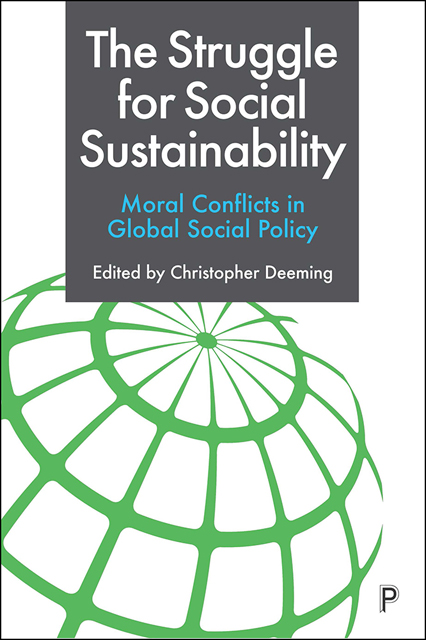Book contents
- Frontmatter
- Contents
- List of boxes, figures and tables
- List of abbreviations
- Notes on contributors
- Acknowledgements
- Preface
- 1 The ‘social’ in the age of sustainability
- 2 ‘No such thing as society’? Neoliberalism and the social
- 3 The social question: reconciling social and economic imperatives in policy
- 4 Disputing the economization and the de- politicization of ‘social’ investment in global social policy
- 5 The social dimension of sustainable development at the UN: from Brundtland to the SDGs
- 6 Paradigm lost? Blocking the path to ecosocial welfare and post- productivism
- 7 World population prospects at the UN: our numbers are not our problem?
- 8 Ageing sustainably
- 9 The political challenges to governing global migration and social welfare
- 10 Bringing in ‘the social’: an intersectional analysis of global crises and welfare
- 11 Global social policy and the quasi- concept of social cohesion
- 12 Putting the global in social justice?
- 13 ‘Go- social’? Inclusive growth and global social governance
- 14 For better or worse?
- 15 The struggle for social sustainability
- Index
7 - World population prospects at the UN: our numbers are not our problem?
Published online by Cambridge University Press: 14 April 2023
- Frontmatter
- Contents
- List of boxes, figures and tables
- List of abbreviations
- Notes on contributors
- Acknowledgements
- Preface
- 1 The ‘social’ in the age of sustainability
- 2 ‘No such thing as society’? Neoliberalism and the social
- 3 The social question: reconciling social and economic imperatives in policy
- 4 Disputing the economization and the de- politicization of ‘social’ investment in global social policy
- 5 The social dimension of sustainable development at the UN: from Brundtland to the SDGs
- 6 Paradigm lost? Blocking the path to ecosocial welfare and post- productivism
- 7 World population prospects at the UN: our numbers are not our problem?
- 8 Ageing sustainably
- 9 The political challenges to governing global migration and social welfare
- 10 Bringing in ‘the social’: an intersectional analysis of global crises and welfare
- 11 Global social policy and the quasi- concept of social cohesion
- 12 Putting the global in social justice?
- 13 ‘Go- social’? Inclusive growth and global social governance
- 14 For better or worse?
- 15 The struggle for social sustainability
- Index
Summary
Introduction
Human population growth is slowing dramatically, and it is slowing because people are having fewer and fewer babies as compared to their parents, everywhere, without exception. More importantly, they are having fewer than we thought they would have a few years ago when the fertility rates were already reducing dramatically and unprecedentedly. Our species has never, ever had so few children. The reason why the total human population of the planet will keep on growing for 50 or 60 or 70 years, but almost certainly not for 80 years, is because people are living longer. It is now no longer because we are having more children.
‘The smaller generation to come – â¯worldwide’
On Monday 17 June 2019 the United Nations (UN) revealed momentous news. The world did not notice, but soon it will. The headline of the UN report (prepared by the Population Division, Box 7.1) read ‘9.7 billion on Earth by 2050, but growth rate slowing’.
Box 7.1: The United Nations Population Division
The Division was established in the early years of the United Nations to serve as the Secretariat of the then Population Commission, created in 1946. Over the years, it has played an active role in the intergovernmental dialogue on population and development, producing constantly updated demographic estimates and projections for all countries, including data essential for the monitoring of progress in achieving the MDGs and now the SDGs, developing and disseminating new methodologies, leading the substantive preparations for the major United Nations conferences on population and development as well as the annual sessions of the Commission on Population and Development. It studies population dynamics and monitors demographic trends and policies worldwide. Population estimates and projections prepared by the Division for all countries on fertility, mortality, international migration, urbanization and population size and structure are widely used by all international bodies. The 2019 Revision of World Population Prospects is the twenty-sixth round of official United Nations population estimates and projections that have been prepared by the Population Division of the Department of Economic and Social Affairs at the United Nations (UN DESA Population Division, 2019).
Source: UN Population Division, www.un.org/en/development/desa/population/about/index.asp (Reproduced with the permission of the United Nations.)
- Type
- Chapter
- Information
- The Struggle for Social SustainabilityMoral Conflicts in Global Social Policy, pp. 129 - 154Publisher: Bristol University PressPrint publication year: 2021



